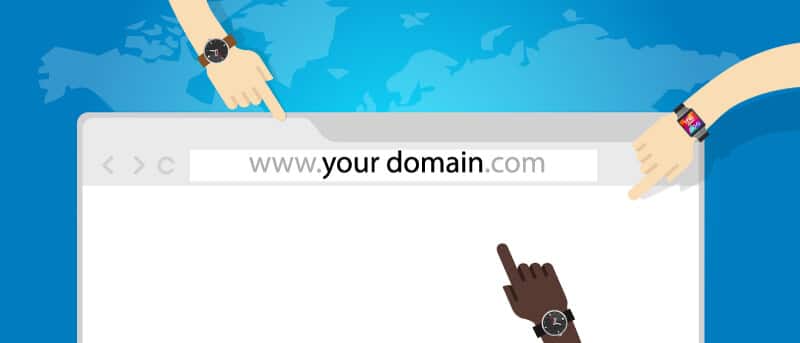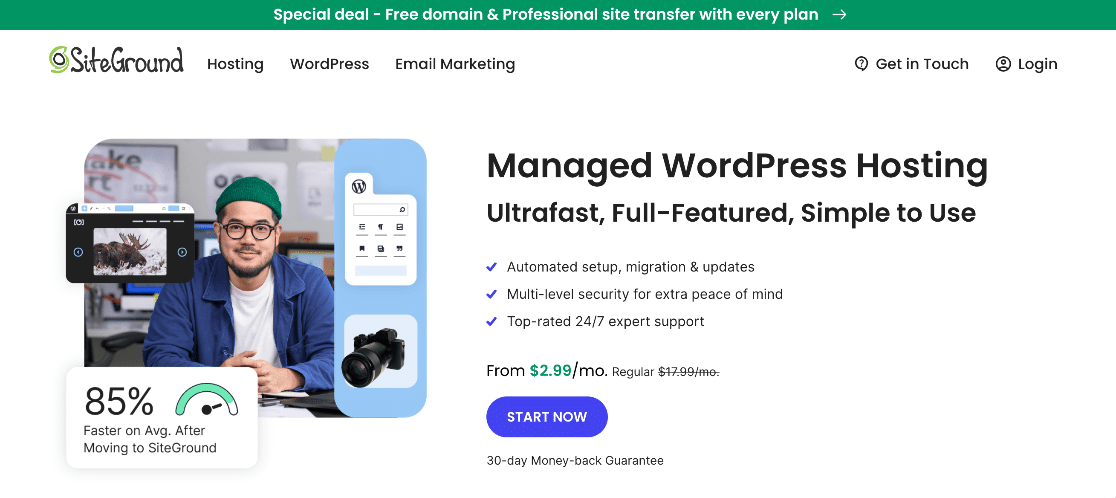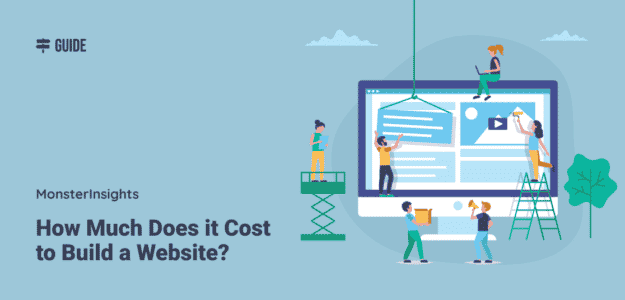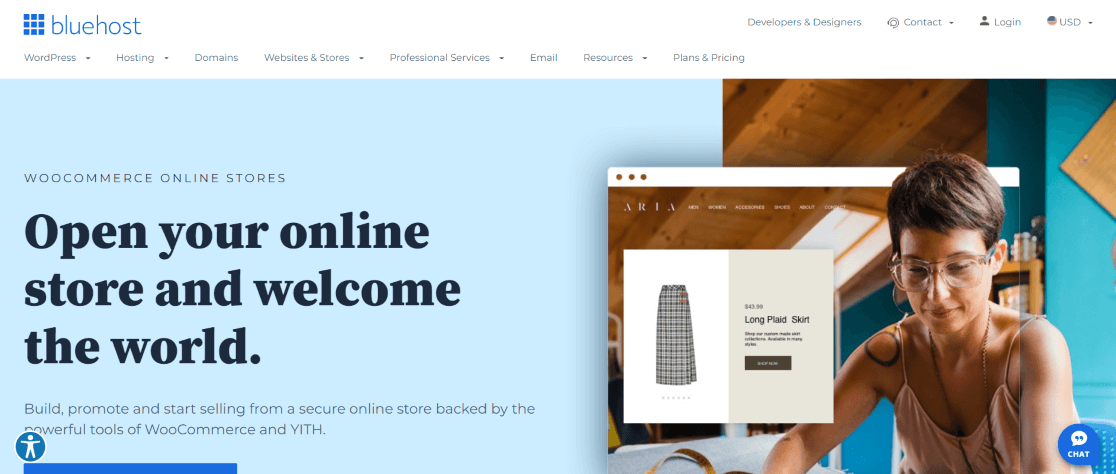How much does a website cost in 2026? While how much it costs to build a website differs a lot based on which platforms and addons you choose to use, a basic, self-hosted WordPress website could cost as little as $115 per year.
It’s difficult to put a price tag on a website, though, as it depends on your budget and the goals you’ve set for your business. That said, in this article, we’ll show you how much it costs to build a website from scratch and which tools you can use to stay on budget while still making room for growth.
In this article, we’ll cover:
- Which Tools Will You Need to Build a Website?
- Plan and Estimate the Cost of Building a Website
- How Much Does It Cost to Build a Website for a Small Business?
- How Much Does It Cost to Create an Advanced Website?
- What’s the Cost of Building an eCommerce Store?
- Tips to Avoid Overpaying When Building a Website
Let’s get started.
Which Tools Will You Need to Build a Website?
When it comes to creating a website, you don’t have to hire professional web designers and developers with technical knowledge. There are many tools available on the web that you can use to easily build a DIY (do-it-yourself) website.
However, if you’ve never built a website before, the number of tools you need to choose and learn to use can be overwhelming.
That’s why we’ve put together a list of tools and their prices, along with helpful tutorials to calculate how much a website costs and get started with setting one up.
Here are 3 things you’ll need no matter which type of website you’re building:
- Domain name
- Website builder tool
- Web hosting
1. Domain Name
A domain name is the web address of your website that users type into their browsers, like www.yourdomain.com or www.MonsterInsights.com. It’s also the URL that appears in search results when people look up your website.

Once you’ve selected a domain name, it’s time to get it registered (purchase it).
When you’re selecting a domain name, it’s important to pick the right extensions as well, such as .com, .org, .co, or .net.
Most websites choose to use .com or .org.
Remember, your domain name registration lasts one year (or however long you purchase it for), so you’ll have to renew it. You must remember to renew your domain name because if you let it expire, your website will go offline and someone else could purchase it.
2. Website Builder Tool
After choosing and purchasing a domain name, it’s time to use a website builder to create your website. It doesn’t matter if you’re a beginner or an expert with tons of experience — using website builders makes it super easy to create a website.

Using a website builder offers many customization options. It lets you create a website that looks and functions the way you want it to. It also helps you add important features like plugins to extend your site’s capabilities and SEO tags to properly optimize your site.
There are different website builders you can use:
- WordPress.org: WordPress is open-source, 100% free, and all you need is a domain and web hosting to get started. We recommend that you use WordPress as it’s very easy to use, it powers more than 40% of all websites on the internet, and it gives you complete control of your website. Need eCommerce? Use WordPress and WooCommerce or Easy Digital Downloads to create an amazing eCommerce website that’ll help you reach your business goals.
- Shopify: Shopify is a good option for building an eCommerce website. It offers attractive themes (free and paid), an easy interface to set up a storefront and shopping cart, and easy management of your store.
- Web.com is one of the original and most popular website builders for small businesses. Since 1999, they’ve helped 3 million customers build websites at a very low price. It comes with an intuitive drag-and-drop builder and tons of ready-made website templates to get you started quickly.
- You can check out many other options, including Squarespace, BigCommerce, and Wix. We definitely recommend WordPress as your first choice, though! It offers the most options for customization.
3. Web Hosting
A big part of the cost of building a website is your web hosting service. Web hosting is the place where you store all your images, videos, files, and other website content. Imagine it as a home for your website.
Let’s say a user wants to view your website and types your domain name in the browser. The user is then directed towards the web hosting server, where all your website content is stored.
Plus, web hosting’s internet connectivity makes your website available to users around the clock, and anyone can access it from anywhere.

When you’re building your website, you’ll come across different types of web hosting services. These include shared hosting, managed hosting, cloud hosting, and more.
So, which type of web hosting should you choose? Let’s take a look at the most common types:
Shared Hosting
Shared hosting is when your website shares a web server with many other websites. You can think of it like renting an apartment in a building.
The benefit of using shared hosting is that it’s affordable and very easy to manage your website, domain, and emails.
If you have a small business, personal blog, or website with low traffic, shared hosting is a great way to get started.
On the downside, shared hosting tends to be not as fast or as secure as managed hosting.
With some shared hosting services, you might experience website downtime and slow-loading pages due to slow server response time. The security features are also not always super strong, as a security mistake on another website could harm your website as well.
That said, not all shared hosting services are bad. Here are a few of the best shared WordPress hosting providers:
- Bluehost – Starting at $1.99/month
- DreamHost – Starting at $2.59/month
- HostGator – Starting at $3.75/month
- GreenGeeks – Starting at $2.95/month
Managed Hosting
Managed hosting is where a managed hosting company takes care of all your web hosting requirements. Think of it as having a house for your website accompanied by a chauffeur, security team, maids, and maintenance crew.
Managed hosting is more powerful and different from shared hosting. The managed hosting company will handle your WordPress website’s security, updates, and backup files and data.
Most companies also provide dedicated or premium customer support, so you can reach out and resolve any problem at any time.
Although managed hosting has its perks, it typically has a higher hosting cost compared to shared hosting. It’s only available for WordPress websites, and some companies can restrict you from using plugins that could slow down your website.
That’s why this type of web hosting is more suited for medium to large-scale businesses, websites with more traffic, or companies looking for an enterprise web hosting service.
Here are our favorite managed WordPress hosting providers:
- SiteGround – Starting at $2.99/month
- Hostinger – Starting at $2.24/month
- Bluehost – Starting at $1.99/month
Now that you know about the tools you’ll need, let’s look at how to estimate the cost of building a website.
Plan and Estimate the Cost of Building a Website
Before you jump into creating a website, it’s important to plan the process based on your goals, or you’ll risk overspending.
Here are a few questions you should ask before starting so you can estimate how much a website will cost to build for you:
1. Which features do you need?
It’s important to know the features you want on your website. We suggest writing them down to help you identify the actual cost.
Some features might require a premium plugin, and others may need to go through the development process. That’s why if you have a list of features ready, you can prioritize those that are the most important to save costs.
Think about features like:
- Landing pages
- Video backgrounds
- Popups to build your email list
- Advanced custom forms
- Social media integration
- Event calendars
2. Should you hire a professional designer or use a pre-built theme?
The quickest and easiest way to get started is to use a pre-built theme. Different website builders offer many themes that you can look through, and they cost everywhere from nothing to requiring a monthly payment to use.
But if you want a website to look and work a particular way, remember that website design and development costs can be extremely high, especially if you go for a custom-built website.
You would need to hire a professional to develop a custom website that works the way you want. The average cost of hiring a professional web developer could vary between $20 to $100 per hour.
That said, you can often get the look you want by selecting a theme that integrates with a page builder or by grabbing a tool like SeedProd. SeedProd can be used to easily design your website from top to bottom, and no experience is necessary.
3. Do you have enough budget to start?
After listing the features you want, deciding which premium plugins you need, and finalizing the website design plan, it’s time to double-check your budget.
Many website projects fail because they overspend and exceed their planned budget. That’s why it’s important to list out your costs and make sure you’re staying within your budget.
Here’s How Much a Website Costs
Now that you’ve answered all the questions you need to ask before getting started, it’s time to build a website.
We’ve broken down the cost of building a website into three different sections:
- How much does a small business website cost to build?
- What’s the cost of building an advanced website?
- How much does a website cost if it’s an eCommerce store?
How Much Does It Cost to Build a Small Business Website?
A simple website for small businesses can cost you between $100 and $500 to build. However, this cost could increase depending on your goals. A custom-built website with lots of features can cost as much as $30,000 or more.
To get started with a website for your small business, you’ll need a domain name and web hosting. The cost of a domain is usually around $14.99 per year, and web hosting is around $7.99 per month. Put them together, and you’re looking at $110.87 per year as the total cost to build a website.

Since this cost can be expensive for many people, we’ve made a deal with Bluehost to offer our users a free domain, free SSL certificate for extra security, and over 60% off on web hosting.
As we mentioned earlier, Bluehost is the best-shared hosting option and is also recommended by WordPress. With its amazing features and low prices, you can save costs while creating a website.
To save more website building costs, you can use free WordPress plugins and a free theme. Here are some free plugins available in the WordPress repository:
Marketing
- MonsterInsights Lite: Helps you make data-driven decisions by connecting your website to Google Analytics.
- WPForms Lite: Add contact forms to your website to generate leads.
- SeedProd Lite: Create amazing landing pages.
- RafflePress: Create and run giveaways on your website.
- Smash Balloon (Lite): Add professional-looking Instagram, Facebook, YouTube, X, and TikTok feeds to your website.
Performance
- AIOSEO: Improve search engine rankings and optimize your website for SEO.
- W3 Total Cache: Boost your WordPress website’s performance, speed, and user experience.
Security
- Akismet: Stop spam comments on your website.
- Duplicator (Lite): Free plugin to back up your website.
How Much Does It Cost to Create an Advanced Website?
Over time, your website will grow, and to keep up with increasing visitors, you’ll need to add more features. This will increase your cost as advanced features will require premium plugins and may require shifting to a more powerful web hosting service.
You can continue to use Bluehost, but with an advanced website, we suggest using a managed hosting service like SiteGround (GoGeek plan).

SiteGround will cost a bit more than Bluehost, but their GoGeek plan comes with premium features such as faster performance, more web storage space, and staging capabilities. It can easily handle up to 100,000 visitors per month.
When building an advanced website, consider using a premium theme for your website. Almost every website builder like WordPress offers paid themes that have extra built-in features, provide priority customer support, and give your website a more professional look.
As for plugins, here are some premium WordPress plugins you can use to grow your website.
Marketing
- MonsterInsights Pro: See how visitors use your website and use the data to make informed decisions
- OptinMonster: Helps convert abandoning website visitors into leads.
- WPForms Pro: Create contact forms, polls and surveys, order forms, and more with its simple drag-and-drop builder.
- Brevo: Brevo is a complete marketing tool kit with advanced features like email marketing, live chat, and CRM.
- AIOSEO Pro: Improve visibility on search engines using advanced features like video sitemaps, redirection manager, internal link builder, and 404 error tracking.
Website Design
- SeedProd: Customize your website with beautiful landing pages using its drag-and-drop builder. It also comes with a ‘coming soon’ and ‘maintenance mode’ functionality.
- CSS Hero: Change your website’s entire design without any coding.
- Envira Gallery: Helps you create a responsive gallery of photos and videos.
- Smash Balloon: Embed social media feeds on your website.
Emails
- Constant Contact: The best email marketing plugin to grow and manage your email subscriber list.
- Drip: One of the best email marketing plugins for WordPress.
Security
- Sucuri: Stop malware and hackers from attacking your website with the best WordPress security plugin.
- Duplicator: Create backups of your website, migrate your site, store data in an offsite location, and restore your website within minutes.
These are just some of the premium plugins you can use, as there are many more. That said, the overall cost of creating an advanced website is between $500 and $1000 per year, depending on how many plugins you use on your website.
What’s the Cost of Building an eCommerce Store?
If you’re planning on running an online store and you’re thinking that it’s going to cost millions of dollars, then you’re wrong. Starting an eCommerce store is very easy, and you don’t have to run your wallet dry.
It’s even easier and cheaper than starting an actual physical store. And by going online, you can reach a much broader and global audience.
To build an eCommerce site, you will need a domain name and web hosting, just like any other website. Since you’ll be starting fresh, we recommend using the Bluehost WooCommerce plan.
With the Bluehost WooCommerce plan, you get attractive features to start and grow your online store. Here are some of its features:
- Free domain for one year
- Free SSL certificate to secure your online payments
- Storefront themes
- Pre-installed WooCommerce with WordPress
- Dedicated IP address
- 24/7 dedicated customer support
For plugins, you can use the free plugins we listed earlier under the section to create a website for small businesses. You can even add premium WooCommerce plugins for added features and help grow your store.
So, the overall cost of starting an eCommerce store is around $190 per year. However, this could go up as you start using premium plugins and extensions.
Tips to Avoid Overpaying When Building a Website
Overspending while creating a website is very easy, and it could lead to your website’s downfall even before it starts. That’s why it’s important to stay within your budget. Here are some tips that can help you:
- Start small and then grow your website. Use free themes and plugins to begin and spend on premium stuff later as your website gets bigger.
- Stay within your budget by prioritizing important features. It’s easy to be attracted by a feature you saw on another website and then spend money on website development costs, only to find out it’s of no use.
- Optimize your website for a great user experience. No matter how small your website is, make sure it runs fast and smooth on all types of devices.
Frequently Asked Questions
How much does it cost for a website to be built?
If you work with a professional website design and development company, it can cost you upwards of $10,000 for a website to be built. It differs a lot depending on what platform you use, how many custom features you need, and the hourly rate of the company you choose.
Can you make a website for free?
Absolutely! You can make a website for free with WordPress. However, I recommend at least spending a couple of dollars on a custom domain so that your business looks more professional. Otherwise, your domain will be something like www.yourcompany.wordpress.com.
Should you pay someone to build a website?
It completely depends on what kind of website you need, how comfortable you are with working on it yourself, and how much time you have to devote to creating your website. Hiring someone to make your website can make sense for some businesses, but it’s easier than ever to build them yourself.
What is the least costly way to build a website?
The least costly way to build a website is to build it yourself. With today’s page builder tools (like SeedProd), building a website yourself is easier than ever. You can simply drag and drop features wherever you want them to go.
What is a reasonable budget for a website?
A simple website for small businesses can cost you between $100 and $500 to build. However, this cost could increase depending on your goals. A custom-built website with lots of features can cost as much as $30,000 or more.
And that’s it!
If you liked this article, you might also want to check out:
21 Best WordPress Themes for Business (Ranked)
How to Start a Membership Site in 9 Easy Steps
How to Create a Landing Page in WordPress (Step by Step)
How to Sell Digital Downloads in WordPress (Step-by-Step Guide)
Not using MonsterInsights yet? What are you waiting for?
Finally, don’t forget to follow us on YouTube for more helpful reviews, tutorials, and Google Analytics tips.


Hi Julius,
If you’re just starting out with creating a website, we highly recommend this guide!
The whole WPBeginner site can really guide you through each step of creating and maintaining a WordPress site. They even have a Facebook group you can join to get help and chat with other beginners.